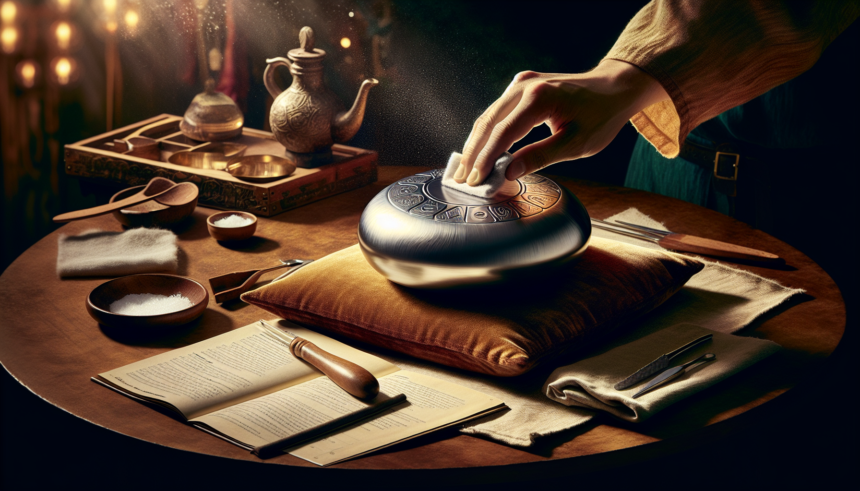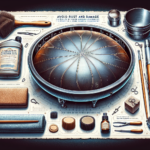The handpan is a fascinating instrument that has captured the attention of musicians and music enthusiasts around the world. Known for its ethereal and melodic sound, the handpan offers a unique auditory experience. However, as with any instrument, maintaining your handpan’s quality requires proper care and attention. This article delves into essential tips for preserving the surface quality of your handpan, ensuring its longevity and pristine appearance.
Understanding the Handpan’s Material
Handpans are typically made from steel, and the surface may be either raw, nitrided, or coated. Understanding this surface material is crucial as each requires different care techniques. The nitrided steel handpan, for instance, has undergone a special heat treatment to enhance resistance to rust and corrosion. Recognizing the type of handpan you own can guide your care routine effectively.
Regular Cleaning
One of the simplest yet most effective ways to maintain the surface quality of your handpan is through regular cleaning. After each session of playing, it’s advisable to wipe down your handpan using a soft microfiber cloth. This action is key in removing oils, sweat, and dirt transferred from your hands during play. Keeping the surface clean prevents buildup that can lead to rust or discoloration.
Protective Oils and Coatings
Applying a protective oil or coating specifically designed for handpans can significantly aid in preserving the instrument’s surface. Such products not only provide a barrier against moisture but also help maintain the handpan’s shiny and new appearance. When selecting an oil or coating, ensure it’s suitable for your handpan’s material—specific types may be required for nitrided versus raw steel.
Storing Your Handpan
Proper storage is a fundamental aspect of handpan care. Always store your instrument in a cool, dry place, avoiding extreme temperature fluctuations that can lead to material expansion or contraction, impacting sound quality and surface condition. Investing in a high-quality case or bag is advisable to provide physical protection from dust, moisture, and accidental external damage.
Avoid Moisture Exposure
Moisture is the arch-enemy of steel instruments. Prolonged exposure to high humidity or direct contact with liquid can cause rust and tarnish the surface of your handpan. If you live in a particularly humid climate, consider using a dehumidifier in the room where you store your instrument. Similarly, avoid playing the handpan with wet or sweaty hands, as this can contribute to corrosion over time.
Minimizing Physical Damage
Over time, scratches or dents can occur on the handpan’s surface, chiefly if it’s not handled with care. Always transport your handpan securely in its protective case, and exercise caution on where and how you set it down. Playing the handpan should be done with bare hands or light gloves to avoid inflicting any harm to the surface with jewelry or fingernails.
Re-tuning and Maintenance Checks
Although the primary focus here is on the surface quality, the overall quality of sound is equally important. Handpans require periodic re-tuning and maintenance checks by professional tuners. During these checks, a professional can also inspect the surface condition, offering solutions or repairs if damage has occurred. Keeping a regular schedule for professional evaluation can preserve both the sound and the aesthetic of your instrument.
Environmental Considerations
Being mindful of the environment in which you play and store your handpan significantly affects its long-term condition. Avoid playing in overly sunny or damp locations, which might lead to warping or tarnishing. Furthermore, engaging with your instrument in a clean, controlled environment minimizes the risk of accidental damage from external factors.
Developing a Routine
Consistency in care is pivotal in sustaining a handpan’s quality. Develop a routine that includes regular cleaning, inspection, and maintenance. By incorporating these practices into your weekly schedule, the task of caring for your handpan can become a seamless part of your interaction with the instrument, rather than an added burden.
Reputable Handpan Accessories
Embrace the use of reputable accessories that complement and extend the life of your handpan. High-quality covers and carrying cases are worthwhile investments. Additionally, explore accessories that enhance your playing experience without compromising the instrument’s surface—such as stands that prevent vibration or rubber rings that secure the instrument during a session.
Conclusion
Preserving the surface quality of your handpan is essential for its longevity and performance. By understanding the material, cleaning regularly, applying protective oils, and storing the instrument properly, you can maintain its visual and acoustic integrity. Keeping your handpan free from moisture exposure, physical damage, and undue environmental stressors are also crucial steps in its care. The consistent application of these essential tips not only ensures your handpan looks as beautiful as it sounds but also fortifies your relationship with this unique and enchanting instrument.
Frequently Asked Questions
-
How often should I oil my handpan?
Applying oil once a month is typically sufficient for maintaining its surface quality. However, frequency can change based on the climate and how often you play your handpan.
-
Can I use any oil or is there a specific type for handpans?
It’s essential to use oil specifically designed for handpans or musical instruments. Avoid oils with additives or scents, as they may damage the finish.
-
What should I do if my handpan gets wet?
Immediately dry the surface with a soft cloth and place it in a dry environment. Do not store it in a case until it’s completely dry to prevent rust.
-
Is it okay to leave my handpan in the car?
No, leaving your handpan in a car exposes it to temperature extremes that can harm its surface and sound quality.
-
Can scratches on the handpan affect its sound?
Minor scratches may not affect sound quality, but deeper scratches or dents might. If you notice a change in sound, consult a professional for assessment.





